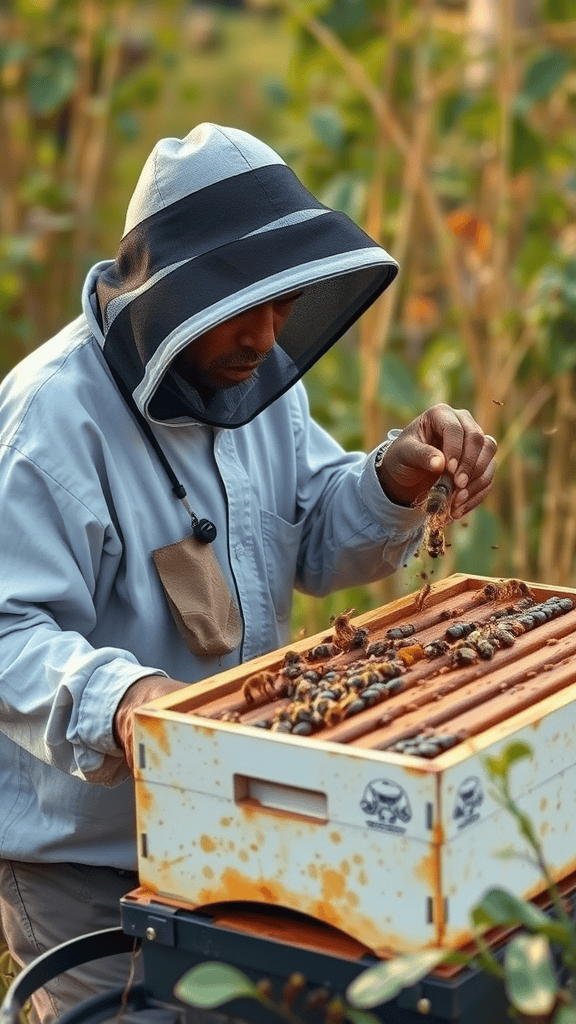The Unique Practices and Traditions of African Beekeepers
African beekeepers hold a wealth of knowledge and a deep connection to their craft. They engage in practices that not only enhance honey production but also contribute to the ecological balance and cultural heritage of their communities. Their unique methods, often passed down through generations, showcase a blend of traditional wisdom and innovative techniques.
In many African regions, beekeeping is more than just a means of livelihood; it plays a crucial role in sustaining the local environment. Here are some distinctive practices and traditions that highlight the expertise of African beekeepers:
- Natural Beekeeping Techniques: African beekeepers often utilize natural approaches that respect the bees’ instincts. They prefer traditional hives made from materials like mud, clay, or woven grasses. This practice not only creates a healthy living environment for bees but also is more sustainable compared to modern, chemical-laden beekeeping methods.
- Community Involvement: Beekeeping is frequently a communal activity in Africa. Many beekeepers form associations that allow them to share knowledge, resources, and best practices. These groups empower members by providing training, facilitating access to markets, and enhancing honey quality.
- Seasonal Harvest: The harvest season is often aligned with local agricultural calendars. Beekeepers time their honey collection to coincide with flowering seasons to maximize production. This understanding of nature ensures that bees have ample resources to thrive while beekeepers gather their harvest.
- Bee Medicine: African cultures have long recognized the medicinal properties of honey and beeswax. Beekeepers often utilize honey in traditional medicine, blending it with local herbs to treat wounds or ailments. This knowledge transforms the beekeeping practice into a holistic approach to health and wellness.
- Protecting Native Bees: Many African beekeepers advocate for the protection of indigenous bee species, emphasizing their resilience and ability to adapt to local conditions. This understanding plays a vital role in preserving biodiversity, which helps ensure sustainable ecosystems.
Additionally, storytelling is an integral part of African beekeeping culture. Elders often share tales that highlight the significance of bees within their communities, linking them to local myths and traditions. These stories not only educate younger generations but also instill a sense of pride and responsibility among beekeepers. Emphasizing the role bees play in nurturing life offers a deeper appreciation for the craft.
Moreover, African beekeepers often incorporate spiritual practices within their beekeeping routines. Many cultures regard bees as sacred creatures, and their behaviors and products are linked to spirituality and rituals. Beekeepers may offer prayers and thanks to the bees before the harvest, respecting the relationship between humans and nature. This spiritual connection enhances their dedication to sustainable practices that protect both the bees and their environment.
In recent years, African beekeepers have begun to embrace modern technologies while maintaining traditional practices. They incorporate mobile apps to monitor hive health, manage pests, and track production. This synergy of ancient methods and new technology creates a platform for growth, innovation, and resilience in the beekeeping industry.
Education plays a crucial role in elevating beekeeping as well. Many organizations are stepping in to provide training to aspiring beekeepers, especially in rural areas. Training programs often focus on sustainable practices, honey quality improvement, and business skills to enhance profitability. This is vital as it empowers new generations to continue the rich tradition of beekeeping while ensuring financial sustainability.
African beekeepers embody a unique blend of tradition, culture, and innovation. Their practices extend beyond merely producing honey; they foster community cohesion, biodiversity, and a respect for nature. As they navigate the challenges of modern agriculture, their commitment to preserving traditional methods while adapting to change sets a remarkable example for sustainable farming worldwide. Whether through communal efforts or individual stories, African beekeepers continue to enrich not only their own communities but also the global beekeeping landscape.
The Economic Impact of Beekeeping in African Communities
In many African communities, beekeeping represents more than just a hobby; it serves as a vital economic engine. Beekeepers across the continent contribute significantly to local economies, shaping livelihood opportunities and enhancing food security. Understanding the depth of this impact sheds light on the integral role beekeepers play in their communities.
Beekeeping activities contribute to the economy in several direct and indirect ways. Here are some key aspects:
- Income Generation: Beekeeping provides a sustainable source of income for individuals and families. By selling honey, beeswax, and other bee products, beekeepers can earn money to support their households.
- Employment Opportunities: The demand for honey and bee-related products creates jobs within the community. From harvesting honey to packaging and selling products, various roles are available, benefiting many individuals.
- Market Access: With increased awareness of the benefits of honey, there is a growing market for beekeeping products. Local artisans and entrepreneurs can tap into this trend, increasing local trade and boosting the economy.
- Tourism Opportunities: Beekeeping can attract tourists interested in organic farming and sustainable practices. Local beekeepers may offer tours, workshops, or even honey tastings, bringing additional revenue to their communities.
One major advantage of beekeeping is its relatively low barrier to entry. Many African communities have an abundance of natural flora, which is perfect for bee foraging. This accessibility allows more people to engage in this sustainable practice, leading to various economic and environmental benefits.
Additionally, beekeeping plays a crucial role in agriculture. By pollinating crops, bees enhance the yield and quality of fruits and vegetables. This not only ensures that farmers can meet local demand but also boosts export possibilities. The symbiotic relationship between agriculture and beekeeping fosters greater food production and economic resilience, making it a worthwhile investment.
Furthermore, beekeeping contributes to environmental sustainability. Healthy bee populations improve biodiversity, supporting various ecosystems. As beekeepers maintain their hives, they actively participate in conserving wildlife habitats, which can be an additional selling point for eco-conscious consumers.
Women, in particular, have made significant strides in beekeeping across Africa. Beekeeping programs designed to empower women have provided financial independence and leadership opportunities. Women beekeepers are shifting the narrative around female entrepreneurs, showcasing their ability to balance traditional roles with economic opportunities. Supporting women in beekeeping not only improves family incomes but also promotes gender equality in the workforce.
The impact of beekeeping on health cannot be overlooked either. Honey is a natural product with numerous health benefits, such as antibacterial properties and nutritional value. Beekeepers can educate their communities about the advantages of consuming local honey, promoting overall well-being and reducing dependency on imported products.
In recent years, various organizations and governments have recognized the potential of beekeeping. Initiatives aimed at training and supporting new beekeepers have emerged, promoting best practices in hive management and honey production. These programs empower communities, helping them to develop sustainable practices that enhance livelihoods over the long term.
Moreover, beekeeping can serve as a catalyst for community cohesion. Beekeepers often come together in groups to share knowledge, resources, and experiences. Such communal support systems foster collaboration and innovation, enabling local economies to thrive collectively.
To sum it up, the economic impact of beekeeping in African communities is profound and multifaceted. From providing a source of income and creating jobs to enhancing agricultural practices and promoting women’s empowerment, beekeeping delivers numerous benefits. As communities continue to harness the potential of this age-old practice, they pave the way for a more sustainable and prosperous future, ensuring that beekeeping remains a cornerstone of their economic landscape.
Conclusion
African beekeepers play a vital role not just in their communities, but also in the global landscape of sustainable agriculture and biodiversity. Their unique practices and traditions set them apart, as they often blend ancient wisdom with modern beekeeping techniques, demonstrating a profound respect for nature. This harmony between people and the environment not only nurtures bee populations but also contributes to the health of ecosystems, making their work an essential part of preserving Africa’s natural heritage.
Additionally, the economic impact of beekeeping in African communities cannot be overstated. By providing a source of income, beekeeping empowers local farmers, particularly women, and helps strengthen economic resilience. Honey, along with other bee products, offers valuable opportunities for trading and local markets, creating pathways for financial stability that many rural areas desperately need. The multiplier effect of this industry can uplift communities, improve livelihoods, and promote food security.
The knowledge and skills of African beekeepers extend far beyond honey production; they represent a unique blend of culture, sustainability, and economic innovation. By fostering beekeeping practices, we not only support these crucial community figures but also contribute to a larger movement toward environmental conservation and economic empowerment. Together, these elements underscore the significance of valuing and promoting the work of African beekeepers, ensuring that both their traditions and economic contributions continue to thrive for generations to come.
As an Amazon Associate, I earn from qualifying purchases.

